Charles E W Bean, Diaries, AWM38 3DRL 606/40/1 - February - March 1916 - Part 2
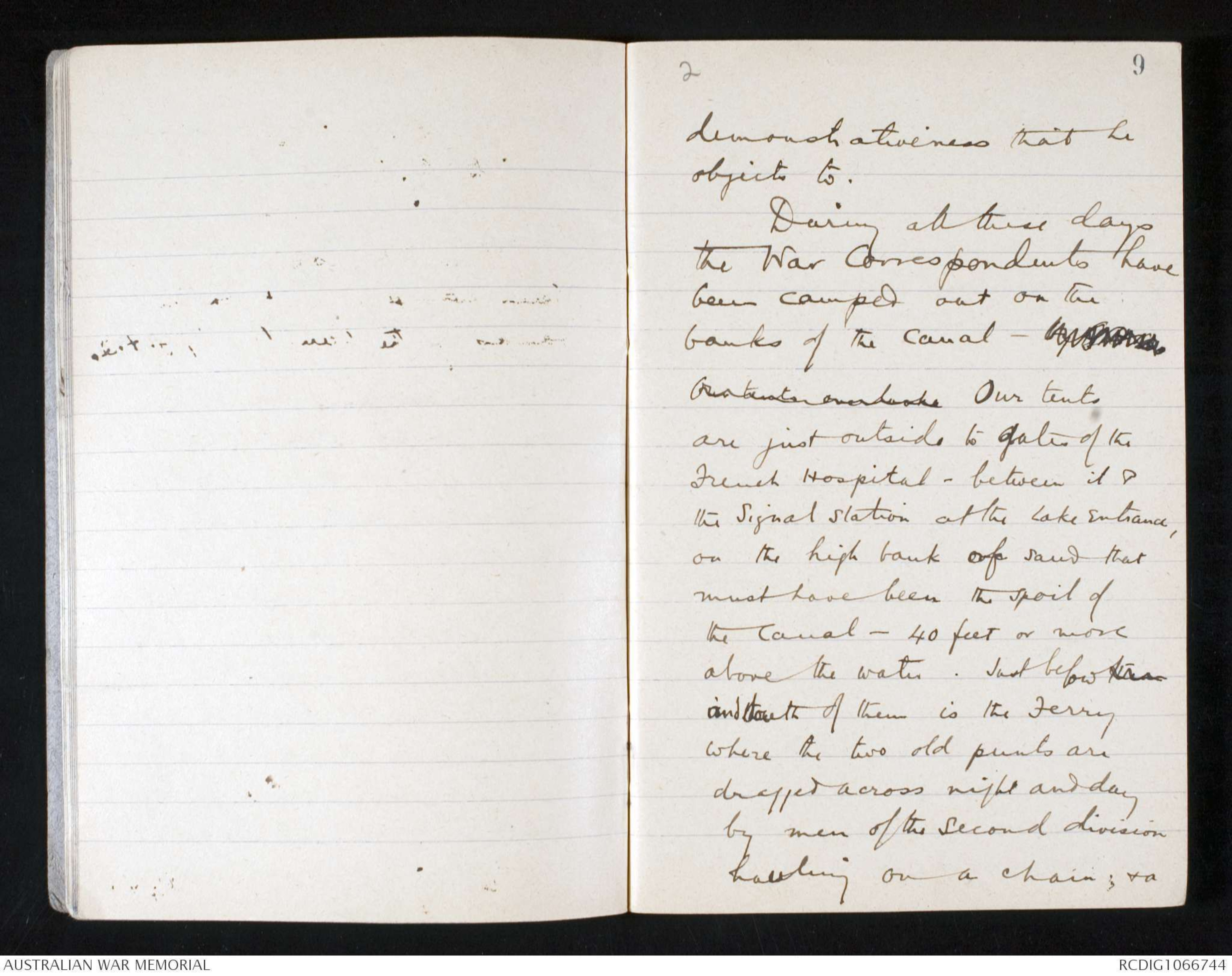
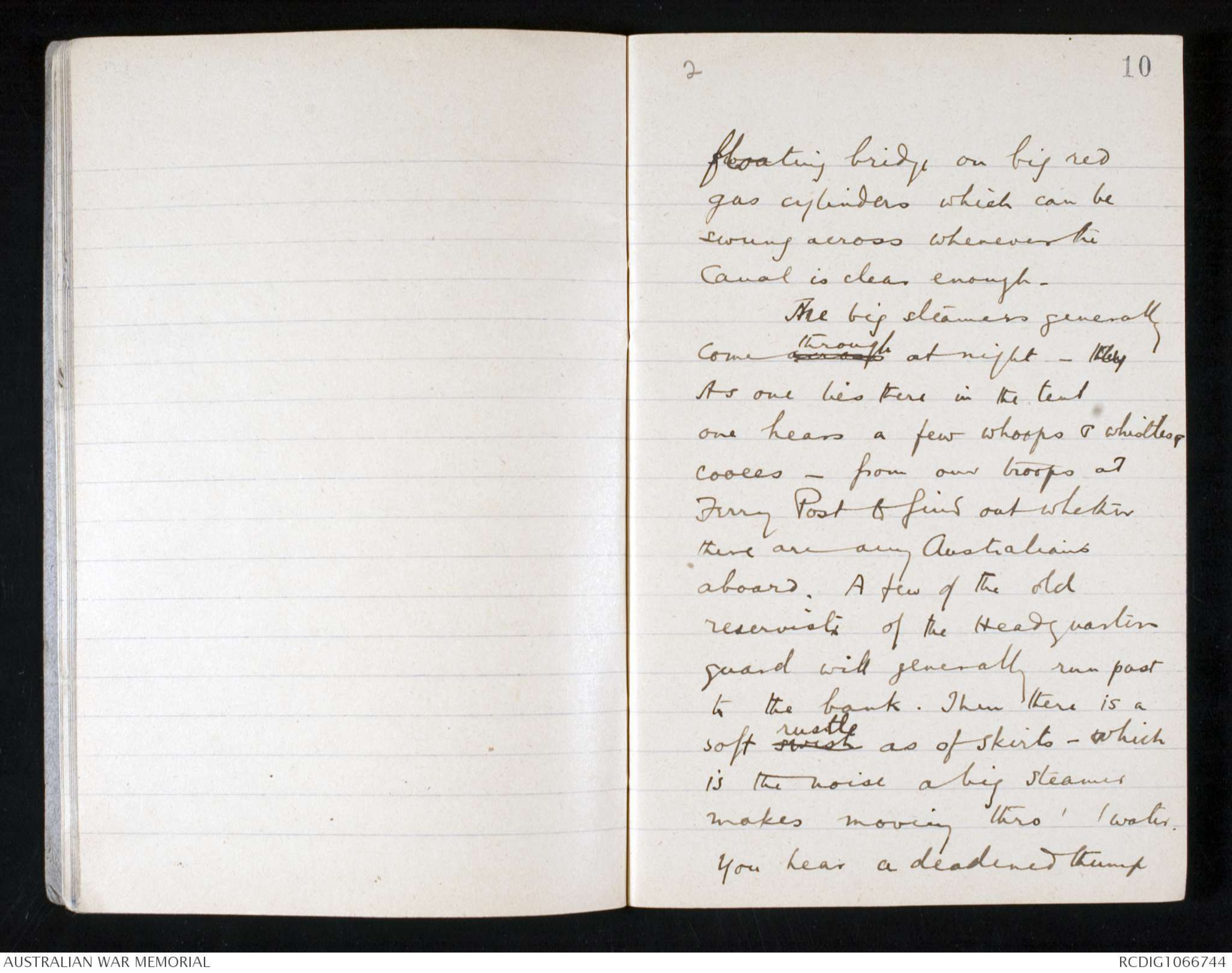
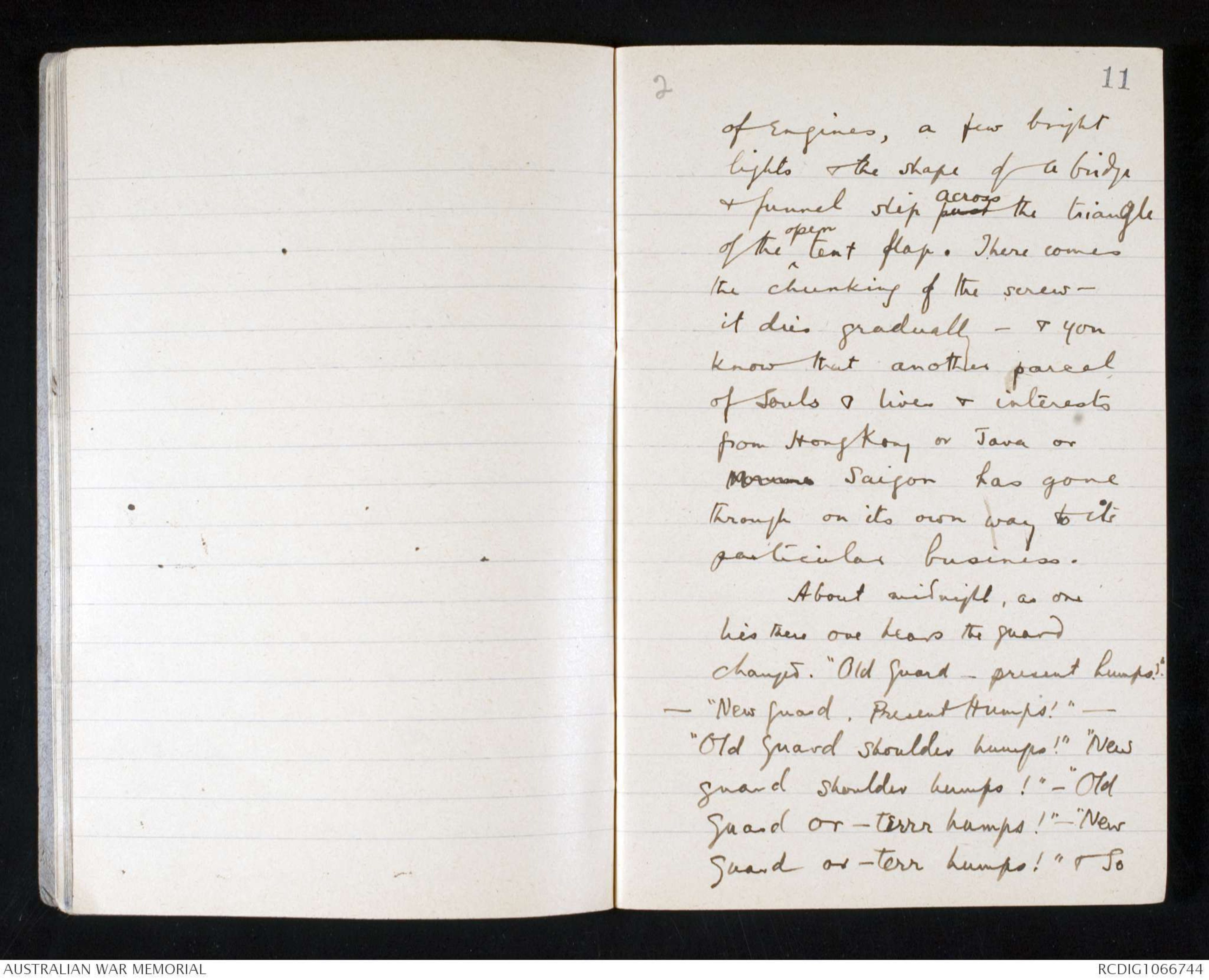
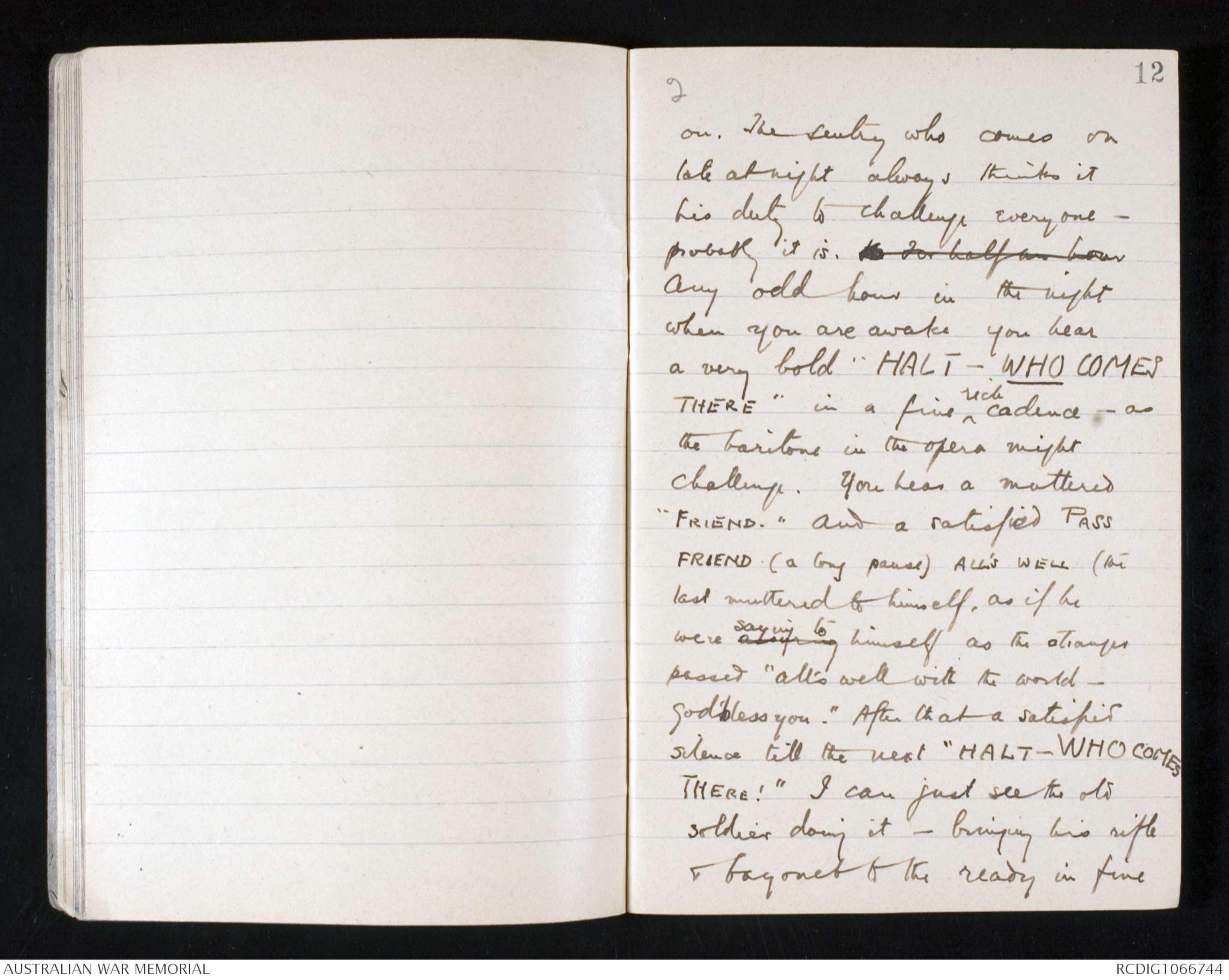
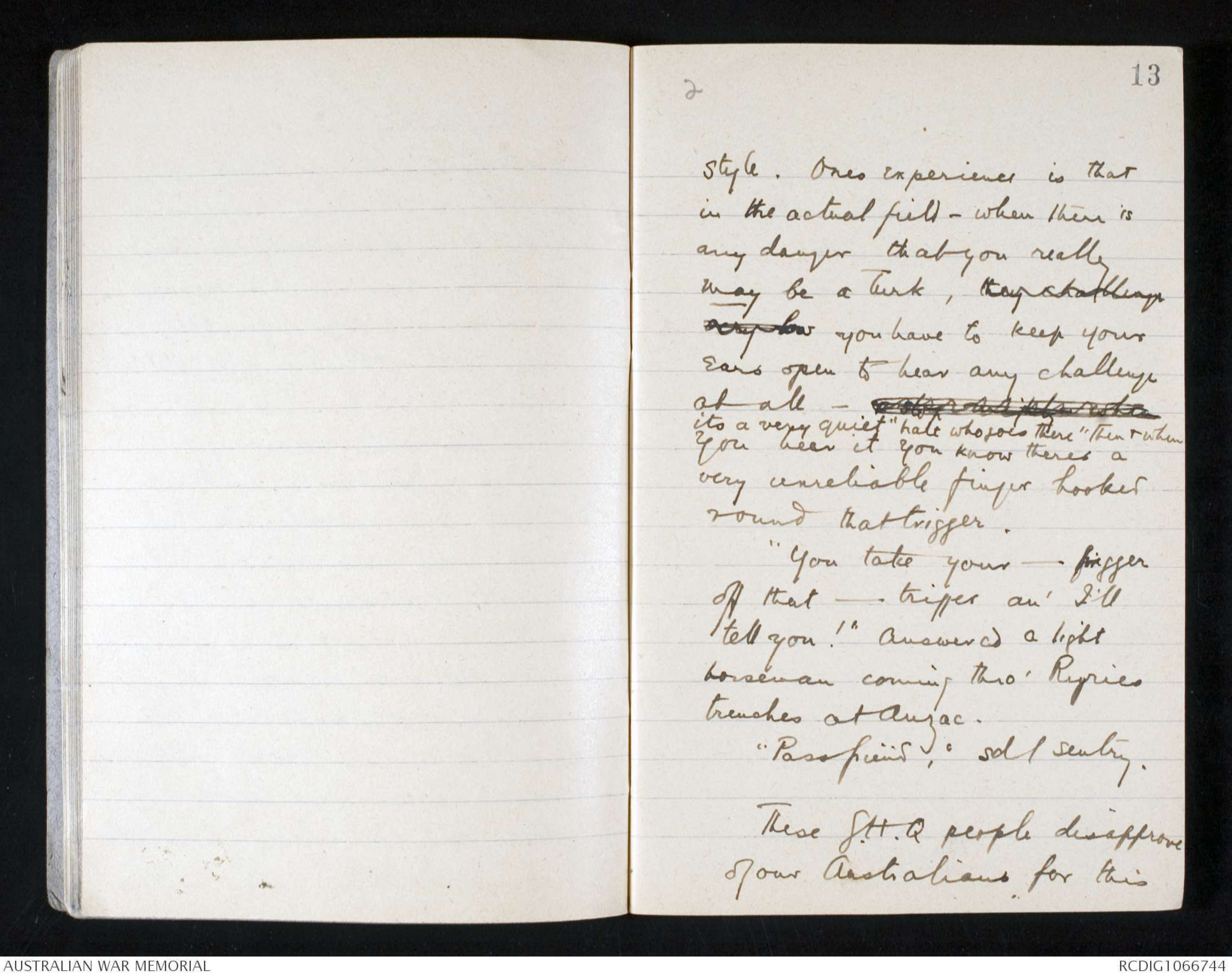
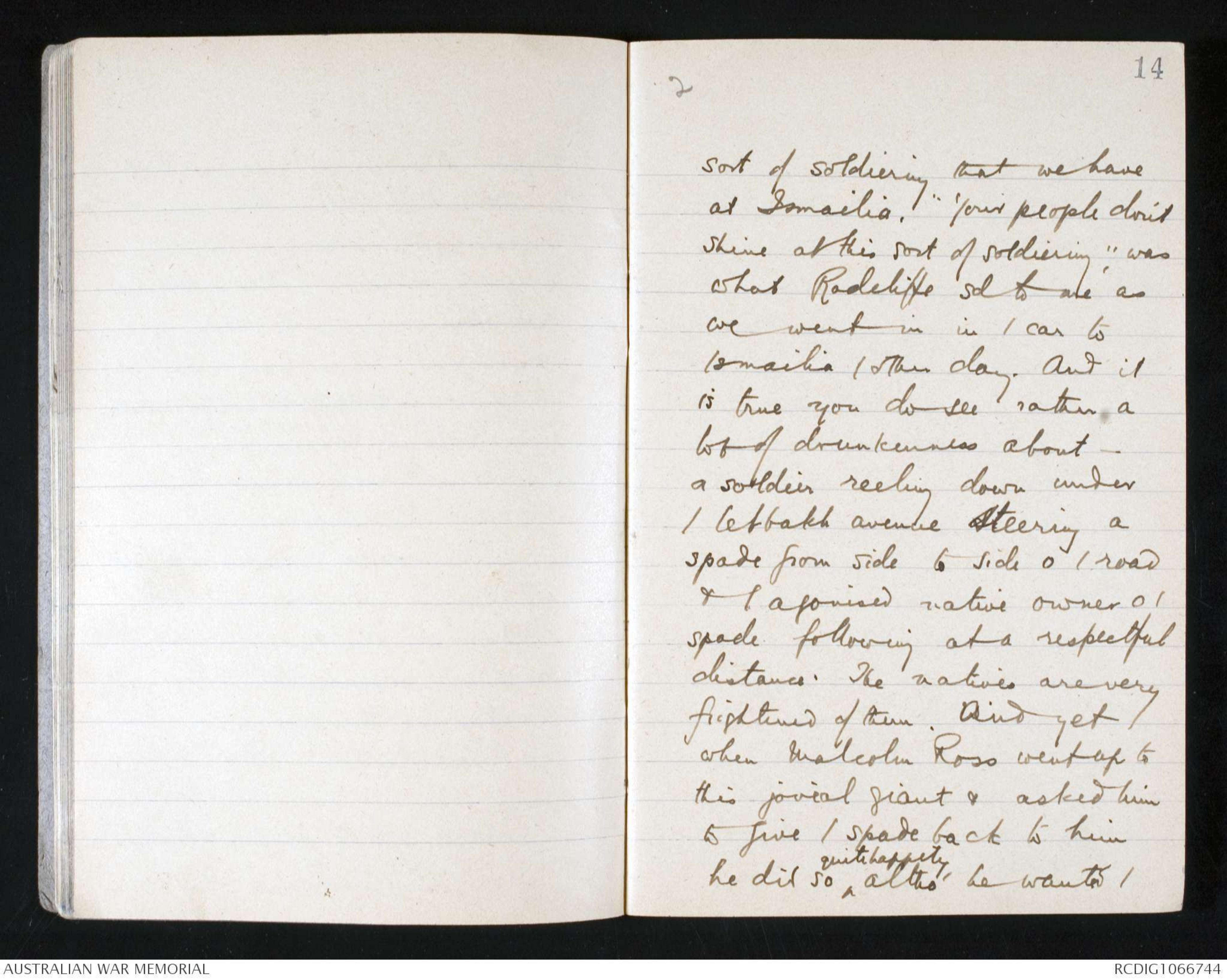
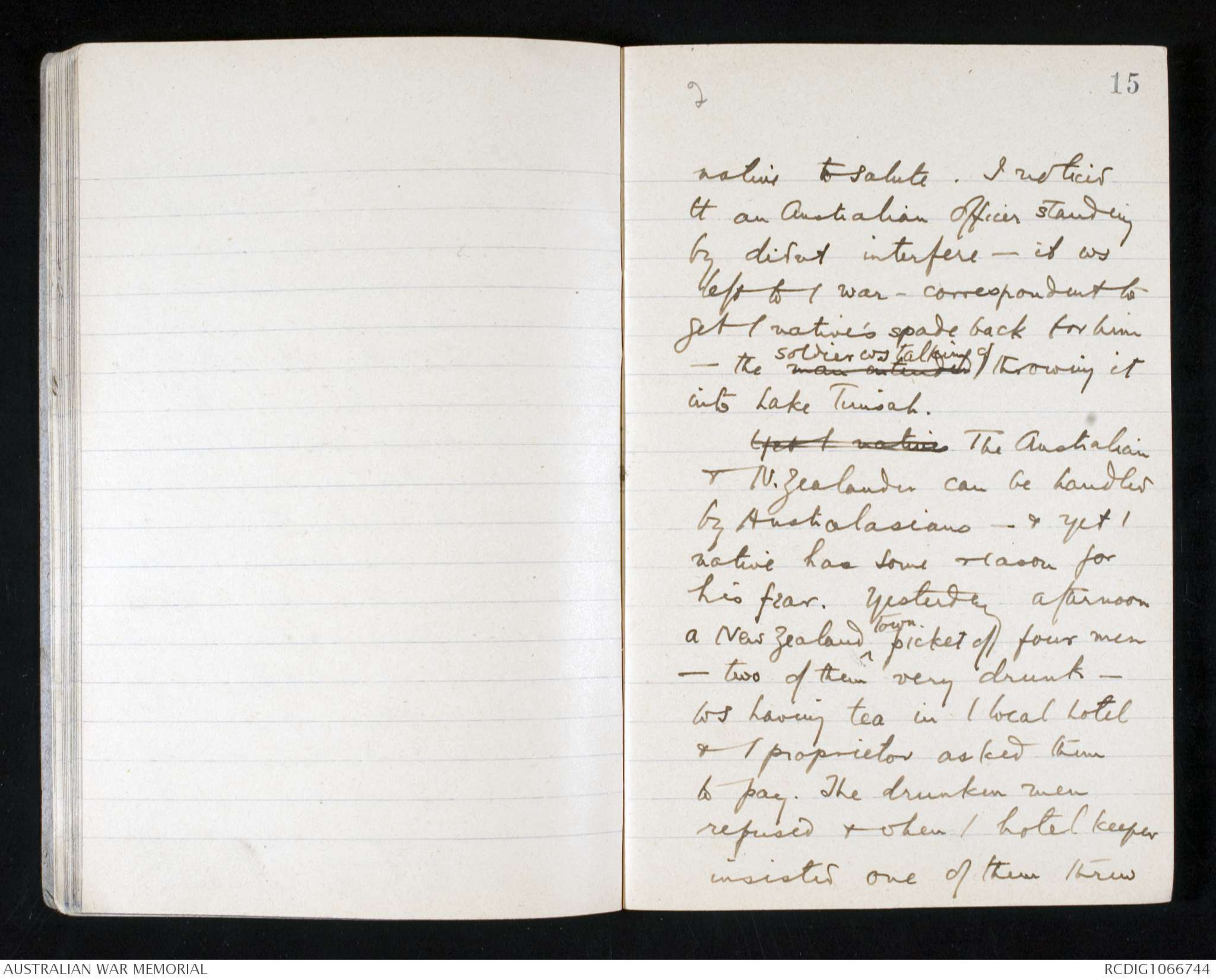
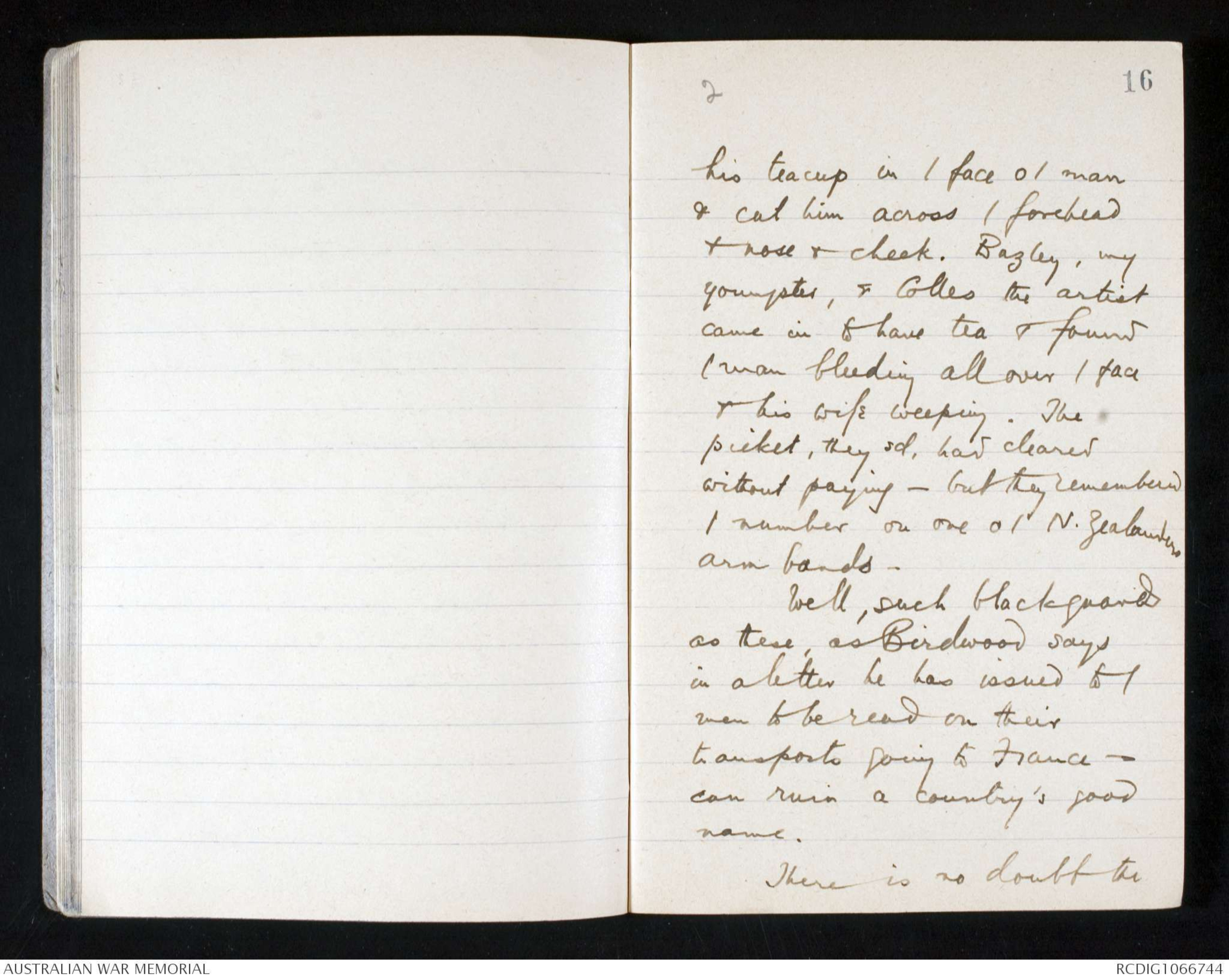
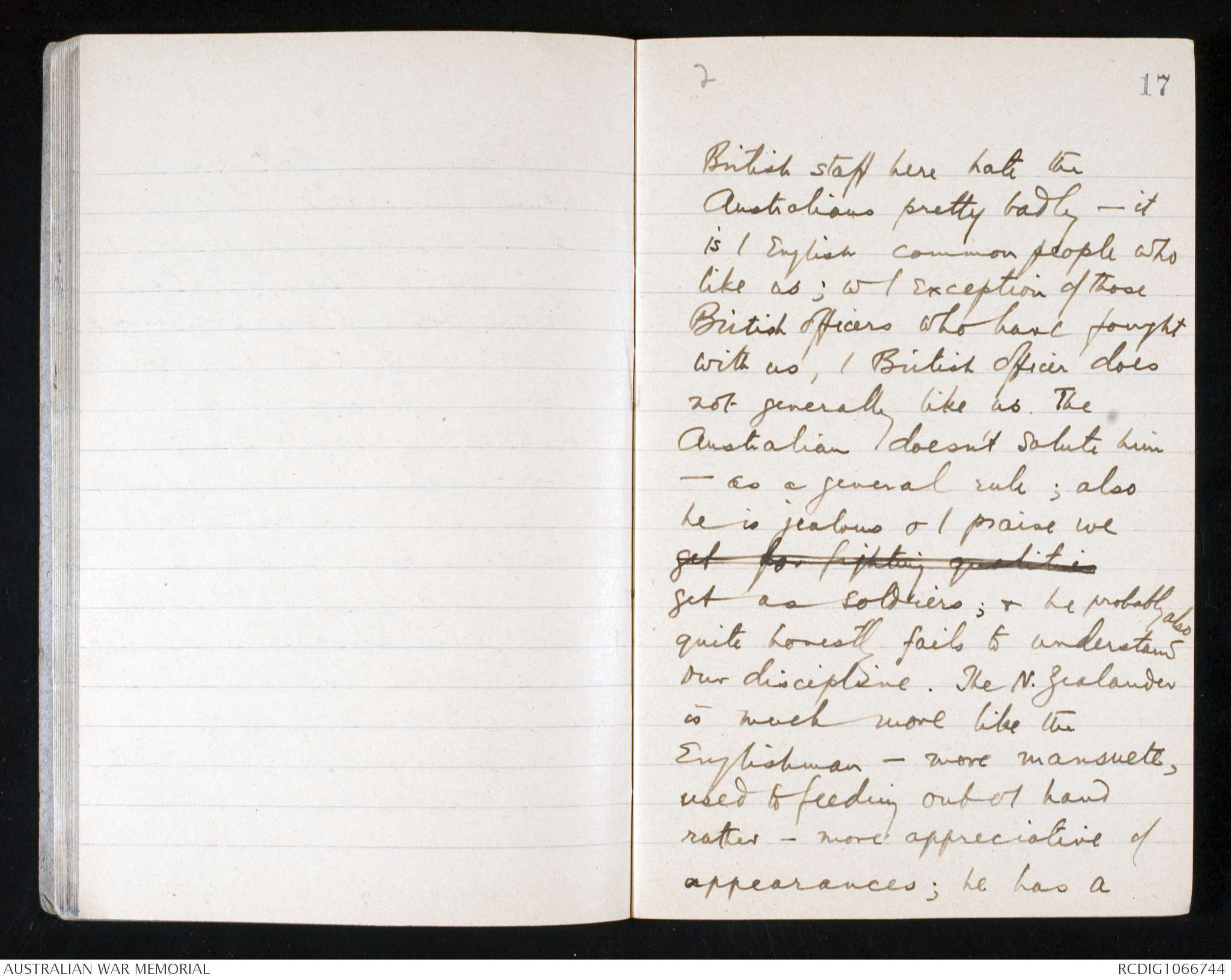
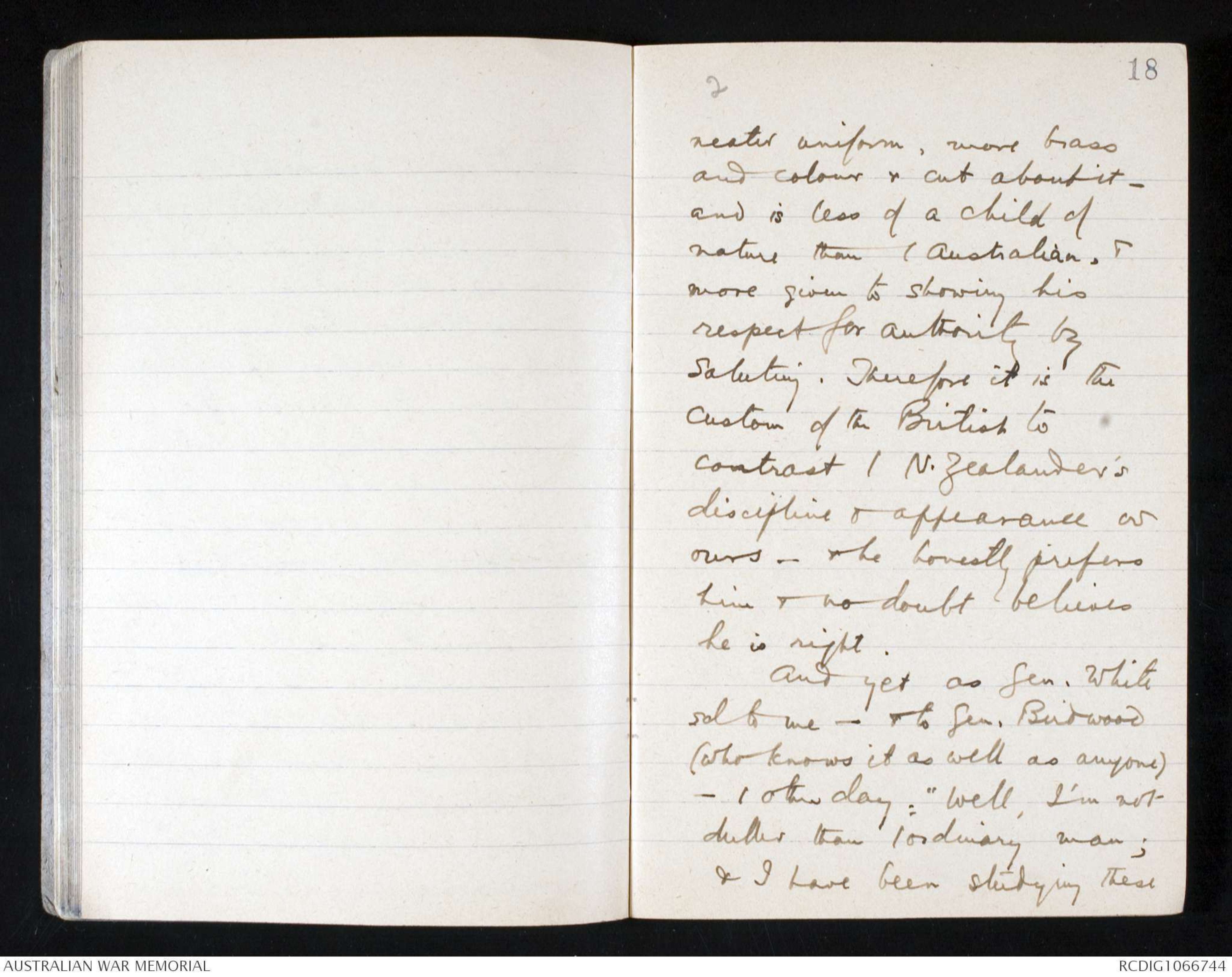
2 9
demonstrativeness that he
objects to.
During all these days
the War Correspondents have
been camped out on the
banks of the Canal – xxxxxour tents overlook Our tents
are just outside to gates of the
French Hospital - between it &
the Signal station at the Lake entrance,
on the high bank of sand that
must have been the spoil of
the Canal - 40 feet or more
above the water. Just below xxxx
and South of them is the Ferry
where the two old punts are
dragged across night and day
by men of the second division
hauling on a chain; & a
2 10
floating bridge on big red
gas cylinders which can be
swung across whenever the
Canal is clear enough.
The big steamers generally
come across through at night – they
As one lies there in the tent
one hears a few whoops & whistles &
cooees - from our troops at
Ferry Post to find out whether
there are any Australians
aboard. A few of the old
reservists of the Headquarters
guard will generally run past
to the bank. Then there is a
soft swish rustle as of skirts - which
is the noise a big steamer
makes moving thro' / water.
You hear a deadened thump
2 11
of engines, a few bright
lights & the shape of a bridge
& funnel ship past across the triangle
of the ^open tent flap. There comes
the chunking of the screw -
it dies gradually - & you
know that another parcel
of Souls & lives & interests
from Hong Kong or Java orxxxxx Saigon has gone
through on its own way to its
particular business.
About midnight, as one
lies there one hears the guard
changed. "Old guard - present humps!."
- "New Guard, Present Humps!" -
"Old guard shoulder humps!" "New
guard shoulder humps!" - "Old
guard or -terrr humps!" - "New
guard or-terr humps!" & So
2 12
on. The sentry who comes on
late at night always thinks it
his duty to challenge everyone -
probably it is. xx For half an hour
Any odd hour in the night
when you are awake you hear
a very bold "HALT - WHO COMES
THERE" in a fine ^rich cadence - as
the baritone in the opera might
challenge. You hear a muttered
"FRIEND." And a satisfied PASS
FRIEND (a long pause) ALL'S WELL (the
last muttered to himself, as if he
were obeying saying to himself as the stranger
passed "all's well with the world -
God bless you." After that a satisfied
silence till the next "HALT - WHO COMES
THERE!" I can just see the old
soldier doing it – bringing his rifle
& bayonet to the ready in fine
2 13
style. Ones experience is that
in the actual field - when there is
any danger that you really
may be a Turk, they challengevery low you have to keep your
ears open to hear any challenge
at all - xxxxxxxx
its a very quiet "halt who goes there" then & when
you hear it you know theres a
very unreliable finger hooked
round that trigger.
"You take your — fingger
off that — trigger an’ I'll
tell you!" Answered a light
horseman coming thro' Ryries
trenches at Anzac.
"Pass friend, “ sd / sentry.
These G.H.Q. people disapprove
of our Australians for this
2 14
sort of soldiering that we have
at Ismailia. "Your people don't
shine at this sort of soldiering," was
what Radcliffe sd to me as
we went in in / car to
Ismailia / other day. And it
is true you do see rather a
lot of drunkenness about -
a soldier reeling down under
/ lebbakh avenue steering a
spade from side to side o / road
& / agonised native owner o /
spade following at a respectful
distance. The natives are very
frightened of them. And yet
when Malcolm Ross went up to
this jovial giant & asked him
to give / spade back to him
he did so ^quite happily, altho' he wanted /
2 15
native to salute. I noticed
tt an Australian officer standing
by didnt interfere - it ws
left to / war - correspondent to
get / native's spade back for him
- the man intended soldier was talking of throwing it
into Lake Tunisah.Yet / natives The Australian
& N. Zealander can be handled
by Australasians - & yet /
native has some reason for
his fear. Yesterday afternoon
a New Zealand ^town picket of four men
- two of them very drunk -
ws having tea in / local hotel
& / proprietor asked them
to pay. The drunken men
refused & when / hotel keeper
insisted one of them threw
2 16
his teacup in / face o / man
& cut him across / forehead
& nose & cheek. Bazley, my
youngster, & Colles the artist
came in to have tea & found
/ man bleeding all over / face
& his wife weeping. The
picket, they sd, had cleared
without paying - but they remembered
/ number on one o / N. Zealanders
arm bands.
Well, such blackguards
as these, as Birdwood says
in a letter he has issued to /
men to be read on their
transports going to France -
can ruin a country's good
name.
There is no doubt the
2 17
British staff here hate the
Australians pretty badly - it
is / English common people who
like us; w / exception of those
British officers who have fought
with us, / British officer does
not generally like us. The
Australian doesn't salute him
- as a general rule; also
he is jealous o / praise weget for fighting qualities
get as soldiers; & he probably also
quite honestly - fails to understand
our discipline. The N. Zealander
is much more like the
Englishman - more mansuete,
used to feeding out of hand
rather - more appreciative of
appearances; he has a
2 18
neater uniform, more brass
and colour & cut about it -
and is less of a child of
nature than / Australian, &
more given to showing his
respect for authority by
saluting. Therefore it is the
custom of the British to
contrast / N. Zealander’s
discipline & appearance w
ours - & he honestly prefers
him & no doubt believes
he is right.
And yet as Gen. White
sd to me - & to Gen. Birdwood
(who knows it as well as anyone)
- / other day: "Well, I'm not
duller than / ordinary man;
& I have been studying these
 Deb Parkinson
Deb ParkinsonThis transcription item is now locked to you for editing. To release the lock either Save your changes or Cancel.
This lock will be automatically released after 60 minutes of inactivity.